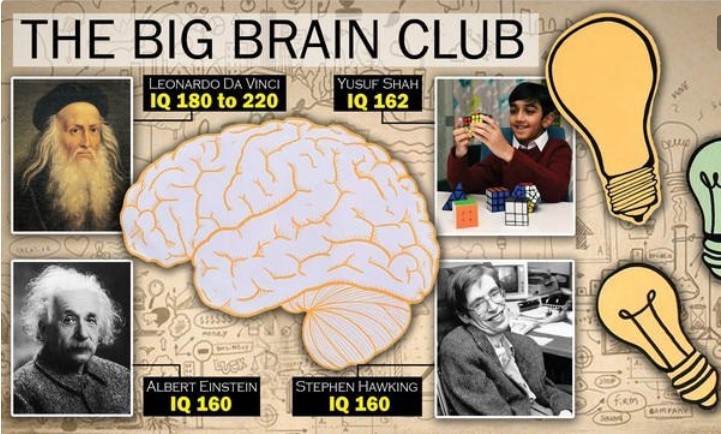Get Smart: Yusuf Shah, the 11-year-old UK boy, who has an IQ higher than Albert Einstein

Genius personalities like Albert Einstein and Stephen Hawking are synonymous with high intelligence.
Joining the club is an 11-year-old boy from the United Kingdom named Yusuf Shah who has reportedly surpassed Einstein and Hawking in terms of Intelligence Quotient (IQ). He scored 162 on the IQ test, two points higher than Einstein and Hawking.
Local media reports suggest that Shah took the MENSA IQ test on an impulse after being called “smart” by his friends.
“Everyone at school thinks I am very smart, and I have always wanted to know if I was in the top 2% of the people who take the test,” Yusuf told Yorkshire Evening Post.
Let’s take a closer look at the prodigy’s story.
About Yusuf Shah
Yusuf Shah had shown signs of brilliance from a very young age.
A resident of Moortown, Leeds in England’s West Yorkshire, Shah has been somewhat of a math wizard from an early age. When he was in the third standard, his parents discovered that he had a knack for squaring numbers.
His father, Irfan Shah, said, “He just has this natural flair for math, and I guess that’s when we sort of realized. Even his school teachers, every time we get school reports, they’re amazing, they say, ‘There’s nothing for us to teach.’”
Yusuf is currently a sixth-standard student at the Wigton Moor Primary School.
As a nursery student, his parents had noticed that Yusuf was learning the alphabet quicker than his peers. His father said, “Even in nursery, we just noticed that he was doing the alphabet and things quicker than other children, but you just thought some kids may pick up the ABCs a bit quicker.”
The 11-year-old boy is also known for his swiftness at solving puzzles like Rubik’s Cube without seeking any outside help.
His parents claim that Yusuf has been, on several occasions, invited to study mathematics with higher classes than his own. However, “for his (Yusuf’s) social development”, they want him to study among peers of his age group.
According to a report by New York Post, in 2019 when he was only seven, Yusuf found a mathematical phenomenon called “Yusuf’s Square Rule”. His father, Irfan, had then contacted a math professor at the University of Cambridge who attested to the phenomenon.
His passion for mathematics is so strong that Yusuf has decided to make it his career. In the future, he plans to study the subject at Cambridge or Oxford University.
About Yusuf’s feat
Yusuf’s achievement was celebrated by the Shah family with a meal at Nando’s.
The prep for the IQ test was nothing extraordinary than what Yusuf was already studying for. While looking at high schools for Yusuf to apply to and when Yusuf sat for admission tests for grammar schools is when he and his parents realised that verbal and non-verbal reasoning was also part of the IQ test.
His father said, “It is a difficult test to prepare for. We just did what we were already doing – nothing specific for the IQ test.”
Meanwhile, Yusuf’s mother Sana said, “I was so proud. He is the first person to take the MENSA test in the family. I was actually a little concerned too – he has always gone into a hall full of kids to take tests. We thought he might be intimidated by the adults [at the centre]. But he did brilliantly.”
An ecstatic Yusuf said, “It feels special to have a certificate for me and about me. I also never thought I would be on the news.”
Getting a score of 160, which is more than Albert Einstein and Stephen Hawking (160), Yusuf scored in the top one per cent of all the people who took the test.
His younger brother Khalid now aspires to follow in his brother’s footsteps and is hoping to take the MENSA test once he gets older.
How is IQ tested?
Back in 1905, psychologist Alfred Binet noticed changes in the education system that prompted him to create an intelligence quotient test.
According to a report by Study, Binet’s goal was to assess the students who couldn’t keep up with their peers in terms of cognitive ability. He thought such a test would help understand which group of students could access general education and who needed more educational support to succeed.
A person’s IQ determines a his or her ability to reason and think in comparison to other people in their age group.
In order to test IQ, researchers first test multiple people from one specific age group to find an average level of intelligence in that group. They then collect data from each age group to ascertain what at least 70 per cent of participants can do at their age.
This test provides researchers a baseline called ‘mental age’. The next step is to determine a person’s chronological age.
To calculate IQ mathematically, a person’s mental age is divided by his or her chronological age and then multiplied by 100.
With inputs from agencies







